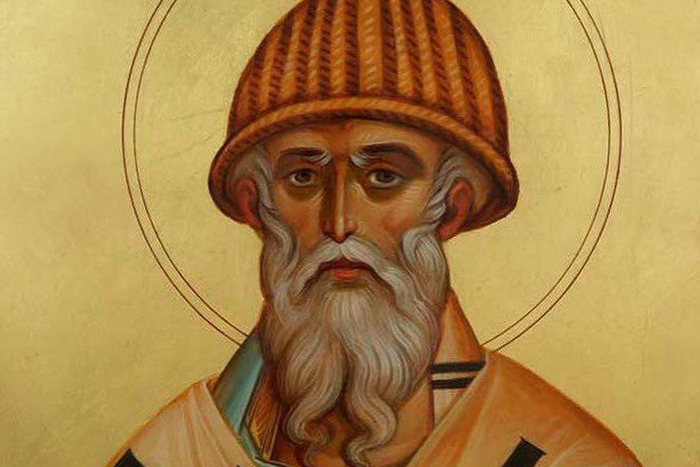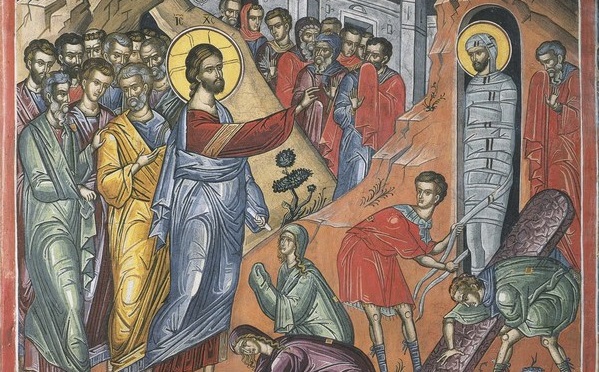
There are valuable testimonies of Socrates Scholasticus, Sozomen and Rufinus, Byzantine historians of the second half of the 4th – 5th centuries, of Saint Spyridon’s life. They were close to him in time and communicated with his disciples and younger contemporaries. We give testimonies of Saint Spyridon of the first two aforementioned historians. The second fragment is especially important for understanding the true point of fast. Many reduce it only to a rigorous “dietary change”, forgetting that the division of food into “clean” (kosher) and “unclean” is Old Testament concept that is mandatory only for a Jew by faith (moreover circumcised one). “Hear, and understand: Not that which goeth into the mouth defileth a man; but that which cometh out of the mouth, this defileth a man”, – we read in the Gospel of Matthew (Matthew 15:10-11). The words of Christ are addressed not only to the Pharisees who were tempting Him, but also to their (voluntary or involuntary) followers among Christians.
- Socrates Scholasticus. Church History. Book I, chapter 12. Of Spyridon, Bishop of the Cypriots:
“With respect to Spyridon, so great was his sanctity while a shepherd, that he was thought worthy of being made a Pastor of men: and having been assigned the bishopric of one of the cities in Cyprus named Trimithus, on account of his extreme humility he continued to feed his sheep during his incumbency of the bishopric. Many extraordinary things are related of him: I shall however record but one or two, lest I should seem to wander from my subject.
Once about midnight, thieves having clandestinely entered his sheepfold attempted to carry off some of the sheep. But God who protected the shepherd preserved his sheep also; for the thieves were by an invisible power bound to the folds. At daybreak, when he came to the sheep and found the men with their hands tied behind them, he understood what was done: and after having prayed he liberated the thieves, earnestly admonishing and exhorting them to support themselves by honest labor, and not to take anything unjustly. He then gave them a ram, and sent them away, humorously adding, ‘that ye may not appear to have watched all night in vain.’ This is one of the miracles in connection with Spyridon. Another was of this kind.
He had a virgin daughter named Irene, who was a partaker of her father’s piety. An acquaintance entrusted to her keeping an ornament of considerable value: she, to guard it more securely, hid what had been deposited with her in the ground, and not long afterwards died. Subsequently the owner of the property came to claim it; and not finding the virgin, he began an excited conversation with the father, at times accusing him of an attempt to defraud him, and then again beseeching him to restore the deposit. The old man, regarding this person’s loss as his own misfortune, went to the tomb of his daughter, and called upon God to show him before its proper season the promised resurrection. Nor was he disappointed in his hope: for the virgin again reviving appeared to her father, and having pointed out to him the spot where she had hidden the ornament, she once more departed. Such characters as these adorned the churches in the time of the emperor Constantine. These details I obtained from many inhabitants of Cyprus. I have also found a treatise composed in Latin by the presbyter Rufinus, from which I have collected these and some other things which will be hereafter adduced”.
- Sozomen. The Ecclesiastical History:
«The reception which Spyridon gave to strangers will appear from the following incident», – Sozomen, who was close to monastic circle, wrote in his Ecclesiastical History. – «In the Quadragesima, it happened that a traveler came upon a journey to visit him on one of those days in which it was his custom to keep a continuous fast with his household, and on the day appointed for tasting food, he would remain without nourishment to mid-day. Perceiving that the stranger was much fatigued, Spyridon said to his daughter, “Come, wash his feet and set meat before him.” The virgin replying that there was neither bread nor barley-food in the house, for it would have been superfluous to provide such things at the time of the fast, Spyridon first prayed and asked forgiveness, and bade her to cook some salt pork which chanced to be in the house. When it was prepared, he sat down to table with the stranger, partook of the meat, and told him to follow his example. But the stranger declining, under the plea of being a Christian, he said to him, “It is for that very reason that you ought not to decline partaking of the meat; for the Divine word shows that to the pure all things are pure”.
This testimony of a caring act of a true Christian, just like Saint Spyridon was, needs no comment. One can only ask a question: how many of our “zealous fasters” would have acted in the same way as he did, not being afraid to “scorn” and “ruin” their gastronomic “merits” before God?
Translated by The Catalogue of Good Deeds
Based on materials: https://azbyka.ru/days/p-mozhno-li-narushat-post



